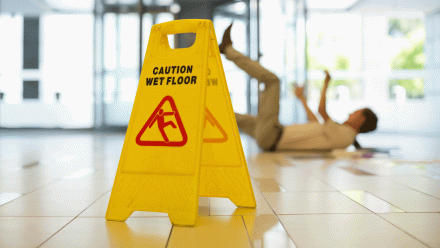Along with the winter season comes slippery ice and wet floors, and you will need to consider what you can do to make your church safer for all who will enter and exit. “Slips, trips, and falls,” as a category, is one of the most common liability areas for churches. In fact, personal injury lawsuits (commonly prompted by slips, trips, and falls) are a perennial top reason churches go to court each year.
Help protect visitors and members at your church by using nonskid mats and wax, immediately cleaning up water spills, and always placing signs around slippery floors.
Consider these examples that prompted lawsuits:
Example. A charity permitted an outside group to use its facility for a Christmas party. During the party, a woman suffered serious injuries when she fell on a slippery floor. As a result of her injuries, the woman underwent surgery for a complete hip replacement.
She later sued the charity, claiming that the floor was unreasonably slippery, and that this dangerous condition caused her to fall. The charity asked the court to dismiss the case, but its request was denied. On appeal, a state appeals court suggested that there was sufficient evidence that the charity retained control over its premises during the party to send the case to a jury.
The court began its opinion by acknowledging that a property owner may be legally responsible for injuries that occur on its premises when they are under its custody or control.
The court suggested that the charity had retained control over its premises during the Christmas party on the basis of the following factors: 1) the charity was responsible for setting up tables for the party; 2) the charity provided a custodian during the entire party; and 3) the charity was responsible for opening the premises at the beginning of the party and locking the premises at the conclusion of the party. The charity’s custodian admitted that he had cleaned the floor prior to the party and that he was on duty and responsible for cleaning the floor during the party.
Example. The Mississippi Supreme Court ruled that an unincorporated church and its board of trustees could be sued by a member who was injured when she slipped and fell on a waxed floor while leaving a Sunday school class. The member argued that she was an “invitee” and, accordingly, that the church owed her a high degree of care, which it breached. The church maintained that the member was merely a “licensee” to whom it owed a minimal duty of care.
The state supreme court observed that the term invitee includes both “public invitees” and “business visitors.”
A public invitee is “a person who is invited to enter or remain on land as a member of the public for a purpose for which the land is held open to the public,” while a business visitor is “a person who is invited to enter or remain on land for a purpose directly or indirectly connected with business dealings with the possessor of the land.”
On the other hand, a licensee is one “who enters upon the property of another for his own convenience, pleasure, or benefit pursuant to the license or implied permission of the owner.” In applying these definitions to church members, the court concluded:
Members of religious associations, in general . . . fall within the category of “public invitees.” Religious bodies do expressly and impliedly invite members to come and attend their services and functions. They hold their doors open to the public. While they do not charge admission fees . . . churches do depend on contributions . . . in order that they may continue to be open to the public.
Therefore, a church member who does not exceed the scope of the church’s invitation is an invitee while attending a church for church services or related functions.
Accordingly, the member who slipped and fell on the waxed floor was an invitee to whom the church owed a high degree of care, rather than a mere licensee to whom the church owed only a minimal duty of care.
These examples illustrate the unpredictable ways that courts will determine the duty of care churches owe to people who enter their buildings. Since lawsuits caused by slips, trips, and falls are so common, and because churches do not want to see anyone injured while on their properties, church leaders should actively and aggressively address this risk.





